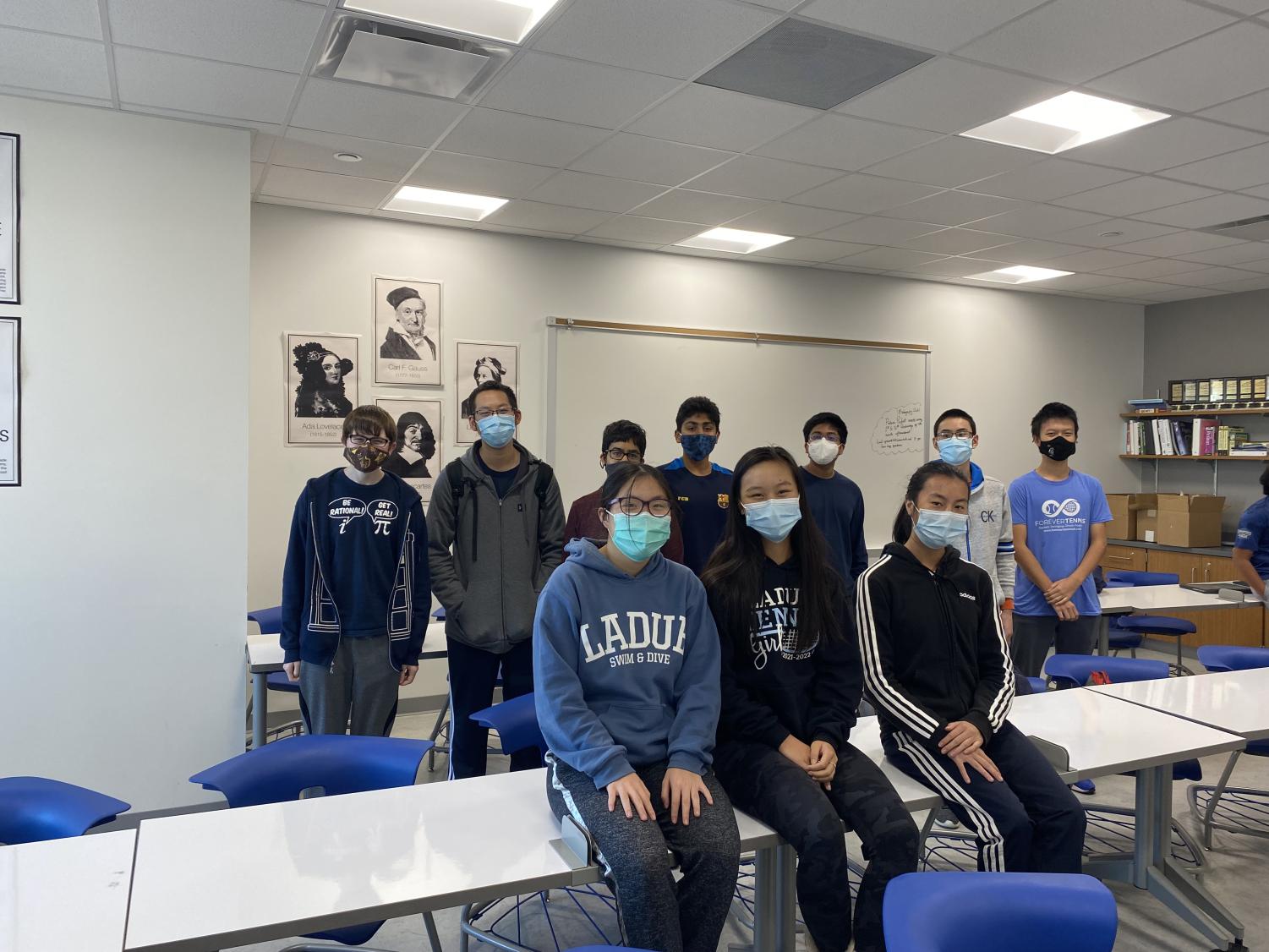
Allen You is a senior at Ladue and the co-editor-in-chief for the Panorama. This is his second year on the staff. His guilty pleasure is listening to too...


November 11, 2021
Ladue’s Math Club is getting ready for a heavy November competition season in room 3346, Mr. White’s room. The latest event was the American Math Competition 10a/12a, abbreviated to the AMC. For those who missed the 10a/12a, Math Club is offering the AMC 10b/12b on Tuesday, Nov. 16.
“The biggest competition in the US is the AMC,” co-president and senior Samuel Chen said. “They’re like 60,000 students in the US who take it and it’s a 25 question test. You get 75 minutes.”
Of the 60,000 are the top high school mathematicians, who take the AMC in hopes of moving up and qualifying for more prestigious tests. In order to thin out the large pool of test-takers, the AMC challenges each student’s math ability.
“It’s not like traditional like high school math problems,” Chen said. “You have to think and use the techniques that you’ve learned over the years to try to solve them.”
The AMC is split into two separate tests for high schoolers, the AMC 10 and the AMC 12, with the AMC 10 being less difficult than the 12.
“The number tells you the maximum grade you can be to take it,” co-president and senior Anthony Wang said. “So, if you’re in 12th grade, you can’t take the AMC 10. Usually people that are in 10th grade or below will take the AMC 10 and people in 11th or 12th will take the AMC 12.”
For freshmen and sophomores, they can take the AMC 10 and/or 12, which gives them options for which one they want to take for qualifying. Either test can qualify into the higher tests, but each have their distinct advantages.
“For the 12, the top 5% in attendance [advance], rather than the top 2.5% [for the 10],” Wang said. “So there’s more people that can qualify through the 12 than the 10.”
If a mathematician does score in the top bracket for their respective AMC test, they can move onto another test, the American Invitational Mathematics Examination, abbreviated to the AIME (pronounced like “Amy”).
“If you do well on either the AMC 10 or AMC 12, you qualify for the AIME,” co-president and senior William Bender said. “And so there are two AIMEs, there’s the AIME 1 and AIME 2, but at Ladue we usually just take the AIME 1.”
Usually, a handful of Ladue students advance to the AIME. So for those who do take the AIME and do well, there’s another round of exams they can take to move even further.
“If you do well on both the AIME and the AMC 10, then you qualify for USAJMO, which is the USA Junior Math Olympiad,” Bender said. “And if you do well on both the AIME and the AMC 12, then you qualify for the USAMO, which is the USA Math Olympiad.”
The AMC is a 75-minute, 25 question multiple choice test and the AIME is a three hour, 15 question test with each answer being an integer from 0 to 999. But the USAMO and USAJMO are entirely different, both being six question tests, administered over a total of nine hours and require a completely different set of skills.
“The AMC 10, AMC 12 and the AIME are about finding the correct answer to a problem,” Bender said. “But the USAJMO and USAMO competitions are about finding proofs of things… in each four and a half hour period you have three questions which are all proof-based.”
Just qualifying to the USAMO or USAJMO, the final set of tests in the American Math Competition series, are incredibly challenging and prestigious honors to receive. For now, the Math Club is putting their focus away from this long-term dream and towards their more pressing competition: Math Madness.
“We’re currently in a 64-team bracket where each team is a school,” Chen said. “In two days we’re going to play the round of 64. We actually just got seeded as seventh in the nation.”
Like the NCAA March Madness bracket-style tournament, teams across the nation face head-to-head, cutting the pool in half with every round. Even though schools play as a team, each mathematician tests on their own.
“There are probably people that work there that create problems and it’s a different problem set every week,” Chen said. “Schools go head to head with each other and the top five scores from each school are counted in the final score.”
Though each contest has it’s own unique format, every contest that the Math Club enters requires a host of mathematical and competitive skills that each member of the team fosters.
“[We build] teamwork as well as problem solving, creativity and problems require you to often think of unexpected solutions,” Wang said. “Math contests are usually divided into four subjects which are algebra, combinatorics, geometry and number theory.”
Math Madness champion, AIME qualifier or USAMO qualifier are all obvious ambitions that the Math Club sets out to achieve. But at the end of the day, all these mathematicians need to persevere is a love of math and an outlet for their passion.
“Of course I like the competitions in Math Club. I like being able to use my knowledge of math to compete in something,” Bender said. “But it’s really because of the math itself is the reason I like the competitions and less of the competitive aspect. If these [competitions] didn’t count for anything, I would probably still do it.”

Allen You is a senior at Ladue and the co-editor-in-chief for the Panorama. This is his second year on the staff. His guilty pleasure is listening to too...